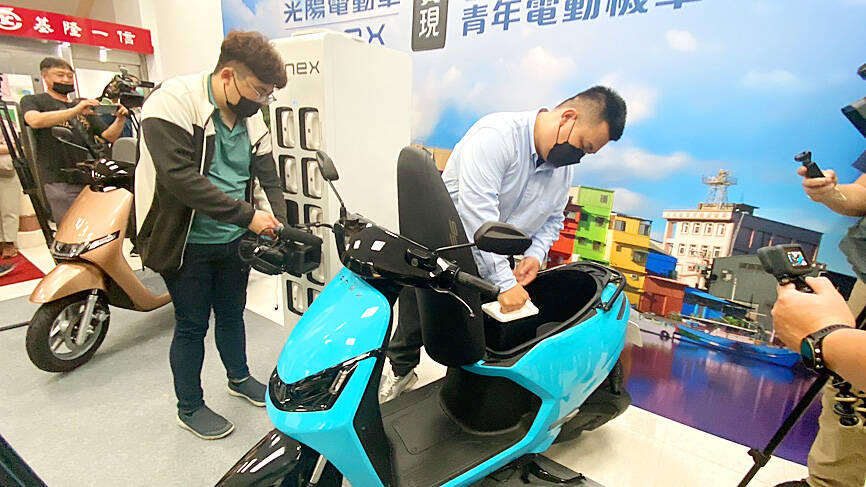Kwang Yang Motor Co (光陽工業), a major manufacturer primarily of gasoline-powered scooters under the KYMCO brand, has pledged to invest NT$4.4 billion (US$142.4 million) in the research and manufacture of electric scooters and battery packs as well as the establishment of electrified infrastructure for sales of electric scooters in Taiwan, the Ministry of Economic Affairs said on Friday.
The InvesTaiwan Service Center on Friday approved the Kaohsiung-based company’s application to participate in the government’s incentive program, the ministry said.
The announcement comes as Kwang Yang is building a business model for the construction of an ecosystem for electric scooters, battery packs and battery-swapping stations around the nation, it said.

Photo: Lu Hsien-hsiu, Taipei Times
Eventually, the company hopes to provide comprehensive electric scooter solutions for individuals, enterprises and government agencies, it added.
Kwang Yang has achieved its goal of setting up 2,600 battery-swapping stations this year, which cover more than 80 percent of Taiwan’s administrative regions and make the company the largest provider of battery-swapping stations in the nation, the ministry said.
In addition, the company plans to carry out research on the reuse of old batteries and their recycling as part of its efforts to achieve its social responsibility and sustainability goals, it said.
InvesTaiwan also on Friday approved plans by three other companies, including machine tool maker Parkson Wu Industrial Co (寶嘉誠工業) and sheet metal processing provider Taiwa Precise Technique Co (台華精技), to establish or expand their manufacturing facilities in the nation, the ministry said.
The “Invest in Taiwan” initiative has to date attracted 1,377 companies to invest more than NT$2.08 trillion in Taiwan, with 10 applications pending review, it said.
The investment figure is expected to reach NT$2.2 trillion by the end of the year, Premier Chen Chien-jen (陳建仁) said on Saturday while attending an investment conference focusing on the private sector’s participation in public construction projects.

Taiwan Semiconductor Manufacturing Co (TSMC, 台積電) last week recorded an increase in the number of shareholders to the highest in almost eight months, despite its share price falling 3.38 percent from the previous week, Taiwan Stock Exchange data released on Saturday showed. As of Friday, TSMC had 1.88 million shareholders, the most since the week of April 25 and an increase of 31,870 from the previous week, the data showed. The number of shareholders jumped despite a drop of NT$50 (US$1.59), or 3.38 percent, in TSMC’s share price from a week earlier to NT$1,430, as investors took profits from their earlier gains

In a high-security Shenzhen laboratory, Chinese scientists have built what Washington has spent years trying to prevent: a prototype of a machine capable of producing the cutting-edge semiconductor chips that power artificial intelligence (AI), smartphones and weapons central to Western military dominance, Reuters has learned. Completed early this year and undergoing testing, the prototype fills nearly an entire factory floor. It was built by a team of former engineers from Dutch semiconductor giant ASML who reverse-engineered the company’s extreme ultraviolet lithography (EUV) machines, according to two people with knowledge of the project. EUV machines sit at the heart of a technological Cold

Taiwan’s long-term economic competitiveness will hinge not only on national champions like Taiwan Semiconductor Manufacturing Co. (TSMC, 台積電) but also on the widespread adoption of artificial intelligence (AI) and other emerging technologies, a US-based scholar has said. At a lecture in Taipei on Tuesday, Jeffrey Ding, assistant professor of political science at the George Washington University and author of "Technology and the Rise of Great Powers," argued that historical experience shows that general-purpose technologies (GPTs) — such as electricity, computers and now AI — shape long-term economic advantages through their diffusion across the broader economy. "What really matters is not who pioneers

TAIWAN VALUE CHAIN: Foxtron is to fully own Luxgen following the transaction and it plans to launch a new electric model, the Foxtron Bria, in Taiwan next year Yulon Motor Co (裕隆汽車) yesterday said that its board of directors approved the disposal of its electric vehicle (EV) unit, Luxgen Motor Co (納智捷汽車), to Foxtron Vehicle Technologies Co (鴻華先進) for NT$787.6 million (US$24.98 million). Foxtron, a half-half joint venture between Yulon affiliate Hua-Chuang Automobile Information Technical Center Co (華創車電) and Hon Hai Precision Industry Co (鴻海精密), expects to wrap up the deal in the first quarter of next year. Foxtron would fully own Luxgen following the transaction, including five car distributing companies, outlets and all employees. The deal is subject to the approval of the Fair Trade Commission, Foxtron said. “Foxtron will be